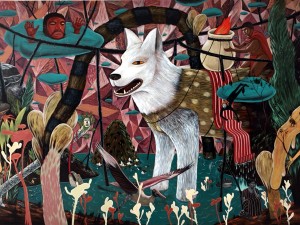By Lito B. Zulueta
Inquirer Arts and Books Editor

Rodel Tapaya's grand-prize winning mural, "Baston ni Kabunian, Bilang pero di Mabilang (Cane of Kabunian, Numbered but Cannot be Counted). CONTRIBUTED PHOTO
SINGAPORE—Philippine artist Rodel Tapaya won Thursday night the grand prize in the Asia-Pacific Breweries Foundation Signature Art Prize, an international art contest among Asia-Pacific artists, for a mural that weaves together ancient myths and folklore and connects them with current realities, such as environmental degradation and disaster flooding.
Tapaya’s work, “Baston ni Kabunian, Bilang Pero di Mabilang (Cane of Kabunian, Numbered but Cannot be Numbered), bested 14 other mainly large-scale art works from 14 other countries across the Asia-Pacifc. The short list of finalists had been selected from 130 works which were nominated from 24 countries by art experts.
Tapaya, 31, received 45,000 Singapore dollars.
“I thank God, the greatest artist of all,” he said in his acceptance speech. He also thanked Ramon E.S. Lerma, director of the Ateneo Art Gallery, for nominating his work, and dedicated his victory to his wife, Marina Cruz, also a top young artist.
A motley group of Philippine art lovers, including Lerma, Philippine Consul General Neal Imperial, gallery owner Lory Juvida, art collector Alex Tan, and Singapore Time Out magazine online editor James Perez Ong, as well as several young Filipino professionals working here lustily cheered when Tapaya’s name was called during ceremonies at the Singapore Art Museum.
Three artists received the Jurors’ Prize: the Japanese Aida Makoto for his acrylic-on-canvas mural, “Ash Color Mountains”; the Australian Daniel Crooks for his video, “Static No. 12 (Seek Stillness in Movement); and the Indian Sheba Chhachhi for her installation, “The Water Diviner.” They received 10,000 SG dollars each.
Singaporean artist Michael Lee won the People’ Choice award for his digital print suite, “Second Hand City.” He also received 10,000 SG dollars.
In a formal statement, the international jury called Tapaya’s work, a 305 x 610 cm acrylic on canvas, “a compelling and monumental-scale work.”
“With its multiple narratives and diverse allegorical references, this stunning mural-sized painting embodies a vibrant strain in contemporary art from the Asia-Pacific region,” the jury said. “While Tapaya does not shy away from drawing on the folklore of his native region, his is neither a naïve nor self-exoticising practice. The artist is audacious in his use of the Philippine mural tradition as well as Latin American magic realism and Bosch-like phantasmagoria.
“Anchored in a postcolonial setting but with far-reaching universal relevance, the work will surely provoke discussion about emerging aesthetic tendencies in Asia-Pacific. Together with the three Jurors’ Choice Award winners, the prize-winning works are ground-breaking in their negotiation of cultural heritage and contemporary forms of expression. They are all worthy of recognition as being among the best art works from the region.”
Tapaya’s winning work was part of his 2010 solo exhibit and bought by Troche Deleon Collection and Art Vantage Ltd, both international art buyers that had seen the work and bought it based on electronic images. The work, along with several others by Filipino artists, was nominated to the Signature prize by Lerma. “Kabunian” made it to the short list and the rest was history.
For the finals exhibit and judging, the work was brought by cargo forwarder from Manila to Singapore Art Museum where it now hangs. Last Thursday night, the work’s Israeli buyers were invited to the awarding ceremonies and it was only their first time to see the actual work and meet the artist, who was the youngest-looking of the finalists.
In an interview with the Inquirer, Tapaya explained he raided Bontoc and Ifugao myths as well as Tagalog folklore to paint an allegory. He said he has always considered “narrative painting” as his strongest suit and he has always sought to tell moral tales when he paints.
The central image of his vast work is the Bontoc myth of a giant canine that saved humans from a great flood. On the back of the dog is an Ifugao mythological character, the son of the god Kabunian, who used a piece of cloth to form mountains and bring fire and warmth to humans. From the Tagalog (Tapaya is from Montalban, Rizal), he adapted the fable of a glutton who turned into a frog.
Careful regard for water and the sacredness of nature are apparent allegorical themes in the work. A detail of the work shows a mountain denuded of trees and washing away the houses on its steep sides and another detail shows a masked logger cutting of a tree which has the face of a man instead of a crown of leaves. The message is clear: by his greed, man brings himself disaster.
Other finalists were Bui Cong Khanh (Vietnam), Chang Yoong Chia (Malaysia), Chen Chieh-jen (Taiwan), Ay Tjoe Christine (Indonesia), Kyungah Ham and Kim Jongku (South Korea), Imran Qureshi (Pakistan), Vandy Rattana (Cambodia), Greg Semu (New Zealand), and Yang Xinguang (China).
The international jury consisted of Indian poet, cultural theorist and curator Ranjit Hoskote; Gregor Muir, executive director of the Institute of Contemporary arts in London; Fumio Nanjo, director of the Mori Museum of Tokyo; Indonesian writer, critic and curator Hendro Wiyanto; and Tan Boon Hui, director of the Singapore Art Museum.
Organized by the Singapore Art Museum and sponsored by the Asia-Pacific Breweries (APB) Foundation of Tiger Beer, Signature is a triennial art contest that started in 2008. For its second edition this year, it has been expanded from the original 12 participating countries to include more countries, such as Australia, Bangladesh, Brunei, Indonesia, Japan, Korea, Myanmar, Nepal, Pakistan and the Philippines.
Tapaya’s winning work is now on exhibit along with the 14 other finalists until March 4, 2012 at the Singapore Art Museum.
When in Cebu City, please visit gregmelep.com for your retirement and real estate needs.
When in Cebu City, please visit gregmelep.com for your retirement and real estate needs.
No comments:
Post a Comment